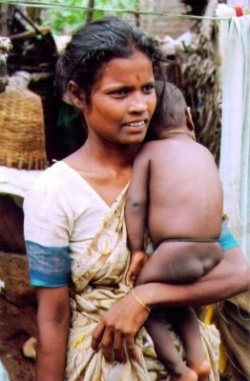World Conference Examines Impact of Social Inequities on Health
High-level representatives from more than 100 countries are meeting this week in Rio de Janeiro for the World Conference on Social Determinants of Health, a World Health Organization (WHO) initiative aimed at building support for policies and strategies that seek to improve health by reducing social inequities.

More than 60 ministers of health and other cabinet members are participating in the conference along with representatives of civil society organizations, health experts and others. They will examine how social factors such as income inequality, living conditions, educational opportunities, gender, race and ethnicity impact people’s health. Participants will also share successful experiences from various countries and regions.
The conference is expected to produce a political declaration expressing the commitment of WHO Member States to address the social determinants of health through national action plans and strategies.
The conference follows up on the work of the WHO Commission on Social Determinants of Health and its 2008 report, Closing the Gap in a Generation. The report showed how social inequities linked to income/wealth distribution, ethnicity and race, gender, education, disability, sexual orientation and geographic location all have profound consequences for the health status, quality of life, and life expectancy of population groups within and across countries.
In the Americas, key social determinants of health include:
• Transportation. Transportation systems and infrastructure in the Americas heavily favor automobiles and produce some 142,000 deaths and 5 million injuries each year. Pedestrians, cyclists and motorcyclists are most vulnerable.
• Housing. Urban slum dwellers and rural residents in the hemisphere suffer poorer health due to lack of water and sanitation services and other housing problems. Rural residents are often more vulnerable to disease-carrying insects and parasites due to poor housing and living environments.
• Environment. Rapid, unplanned urbanization has increased vulnerabilities to natural disasters such as floods, earthquakes and hurricanes.
• Lifestyle changes. The “nutrition transition” throughout the Americas has people turning from traditional diets based on fresh foods toward modern diets high in calories from highly processed foods. Many urban areas lack recreational spaces and adequate security to encourage outdoor activity.
The report of the Commission on Social Determinants of Health urged governments to incorporate health into all public policies to improve health, reduce health inequities, and promote development. Since the report was issued, countries have adopted a range of strategies and programs addressing the social determinants of health. Conference participants will discuss the lessons learned from these strategies and programs, several of which are from the Americas. They include:
• Brazil’s Bolsa Familia Program, the world’s largest conditional cash transfer program, which reaches nearly 13 million families in 5,564 municipalities across Brazil. The program has reduced food insecurity and improved child growth among participating families while contributing to more equitable income distribution at the national level.
• Chile’s “Steps toward Equity in Health” agenda, developed by the Ministry of Health and regional health authorities to advance the recommendations of the WHO Commission on Social Determinants and Health. The “steps” included quantifying and monitoring health inequities, assessing the effects of health policies and programs on these inequities and identifying interventions involving the community and other sectors. The agenda covers areas including prenatal to early child health care, working conditions and barriers to access to health services.
• The Canadian Reference Group on Social Determinants of Health, a group of experts and stakeholders that reviews evidence, explores opportunities for action, and facilitates cross-sector partnerships among business, labor, social and community development, education, urban planning and the environment to promote policy synergies and collaboration on health inequalities.
• The National Partnership for Action to End Health Disparities (NPA), sponsored by the United States Department of Health and Human Services and its Office of Minority Health. The partnership’s National Stakeholder Strategy for Achieving Health Equity includes 20 community-driven strategies aimed at closing the health gap for the country’s racial, ethnic and underserved communities.
The three-day conference will open at 2 p.m. on Wednesday and will be webcast live (see links below). Opening day speakers will include:
Margaret Chan, Director-General, World Health Organization
Alexandre Padilha, Minister of Health of Brazil and Conference President
Michel Temer, Acting President of Brazil
Tereza Campello, Minister of Social Development of Brazil
Rebeca Grynspan, Associate Administrator, United Nations Development Program (UNDP)
Andreas Loverdos, Minister of Health and Social Solidarity of Greece
Kathleen Sebelius, Secretary of Health and Human Services of the United States of America
Michel Sidibé, Executive Director, UNAIDS
Maria Guzenina-Richardson, Minister of Health and Social Services of Finland and Conference Vice-President.
NOTE ON WEBCAST:
Plenary sessions of the conference will be webcast live in English, Spanish, Portuguese and French at: http://www.canal.fiocruz.br/determinantes/.
Parallel sessions will be webcast live in English and Portuguese at: http://www.canal.fiocruz.br/determinantes/index_salas.php.
20.10.2011


